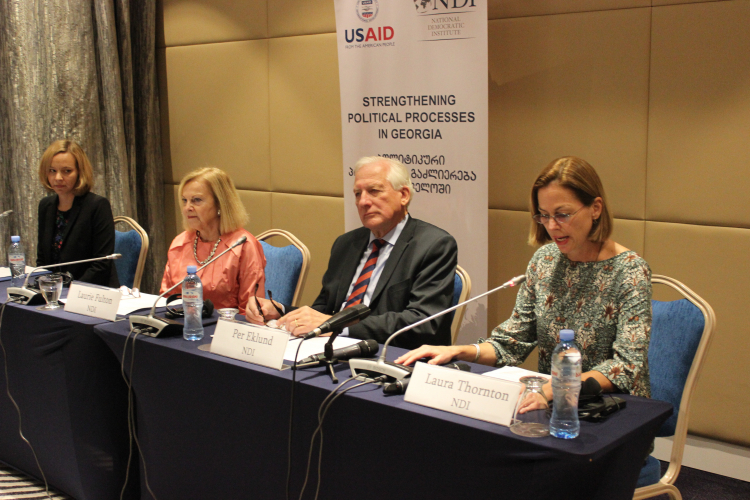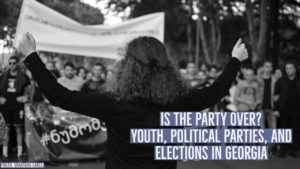
NDI Press Conference in Georgia. (R-L) Laura Thornton, NDI Georgia Country Director; Ambassador Per Eklung; Ambassador Laurie Fulton, and Laura Linderman, The Atlantic Council
Georgia “is a trailblazer for democracy in the Caucasus region” but it needs support from the West in order to maintain its liberal democratic trajectory, says president-elect Salomé Zourabichvili.
“During the bitter campaign, my opponent, a Moscow-educated former Soviet diplomat, tried to smear everything I stood for, including my patriotism and my pro-western credentials,” she writes for The Financial Times:
It now falls on me to unite this country. I will seek to relieve party divisions and other tensions between people and improve our democratic processes. I am grateful to those who voted for me to be their president. I am also grateful to those who voted against me because they participated in our democratic process. I promise to guarantee Georgia’s democratic development, individual freedoms and the rule of law.
 Georgia’s democracy faces an uncertain future, the Atlantic Council suggests, while the country risks ‘squandering’ its democratic assets, according to the National Democratic Institute’s (NDI) election observer delegation.
Georgia’s democracy faces an uncertain future, the Atlantic Council suggests, while the country risks ‘squandering’ its democratic assets, according to the National Democratic Institute’s (NDI) election observer delegation.
The recent election day was largely orderly, but the pre-election period was divisive, “tarnished by incidents of violence and intimidation,” said NDI in its preliminary statement on November 29. NDI said in its report that the period ahead of the runoff “experienced sporadic incidents of violence, reports of intimidation, and other practices that violated the spirit, and arguably the letter, of election laws.” Campaign rhetoric grew “more aggressive and hostile between the two rounds, with messages of fear and threats of instability.”
Following a number of constitutional amendments, Georgia has shifted to a parliamentary system, where the bulk of political power is vested in the parliament and the prime minister. However, the current weakness of political parties poses a major challenge for this transition, the National Endowment for Democracy adds. For the first time in Georgia’s history, lackluster support for the ruling party’s candidate resulted in the necessity of a second round of a presidential election on November 28.
 The recent election has also revealed a worrying development in Georgian politics: the widening gap between political parties and young people. Georgian political parties tend to be vehicles for a particular charismatic personality and tend emerge and disappear within a few years’ time. Georgia’s citizens, particularly youth, are disillusioned with party politics, seeing it as superficial and tainted with corruption. Politically active youth often refuse to engage with political parties, regarding them with cynicism and distrust; instead, young people show a preference for spontaneous activism and taking to the streets. As Georgia undergoes reforms to complete its transformation into a parliamentary republic, this important gap calls into question whether the Georgian parliament can become a durable and effective institution if parties remain weak.
The recent election has also revealed a worrying development in Georgian politics: the widening gap between political parties and young people. Georgian political parties tend to be vehicles for a particular charismatic personality and tend emerge and disappear within a few years’ time. Georgia’s citizens, particularly youth, are disillusioned with party politics, seeing it as superficial and tainted with corruption. Politically active youth often refuse to engage with political parties, regarding them with cynicism and distrust; instead, young people show a preference for spontaneous activism and taking to the streets. As Georgia undergoes reforms to complete its transformation into a parliamentary republic, this important gap calls into question whether the Georgian parliament can become a durable and effective institution if parties remain weak.
In a forthcoming presentation, civil society activist Vera Gogokhia will discuss the role of youth in the recent Georgian elections and consider the roots of the current disconnect between political parties and young people, and whether the gap can be bridged. Comments by NED Senior Director for Russia and Eurasia Miriam Lanskoy will follow.
Is the Party Over? Youth, Political Parties, and Elections in Georgia
featuring
Vera Gogokhia, Reagan-Fascell Democracy Fellow
with comments by
Miriam Lanskoy, Senior Director for Russia and Eurasia, National Endowment for Democracy
moderated by
Sally Blair, Senior Director of Fellowship Programs, National Endowment for Democracy
Tuesday, December 11, 2018. 3:00 p.m.–4:30 p.m.
1025 F Street, N.W., Suite 800, Washington, D.C. 20004
Telephone: 202-378-9675
Vera Gogokhia is a leading civic activist who in 2012 founded You for Democracy, a Tbilisi-based NGO that focuses on developing a student activist network in Georgia. In 2007, she co-founded the American-Georgian Institute for Liberal Education (AGILE), alongside Ghia Nodia and Charles Fairbanks, to encourage classroom study of major works of political theory in higher education. This led to the launch of a project to promote free discussion about democratic values through youth networks nationwide. During her fellowship, she plans to examine the current rift between youth movements and political parties in Georgia, analyzing data from both sides to understand why young people reject traditional parties. Her goal is to explore avenues that would serve to bridge the gap and encourage youth engagement in Georgian politics.
Miriam Lanskoy is senior director for Russia and Eurasia at the National Endowment for Democracy. In 2003, she was awarded a PhD in international affairs from Boston University for her dissertation on the Russian presidency, the Chechen wars, and social and political problems of the North Caucasus. She has over twenty-years of experience analyzing political trends in Eurasia and implementing programs to promote democracy.







